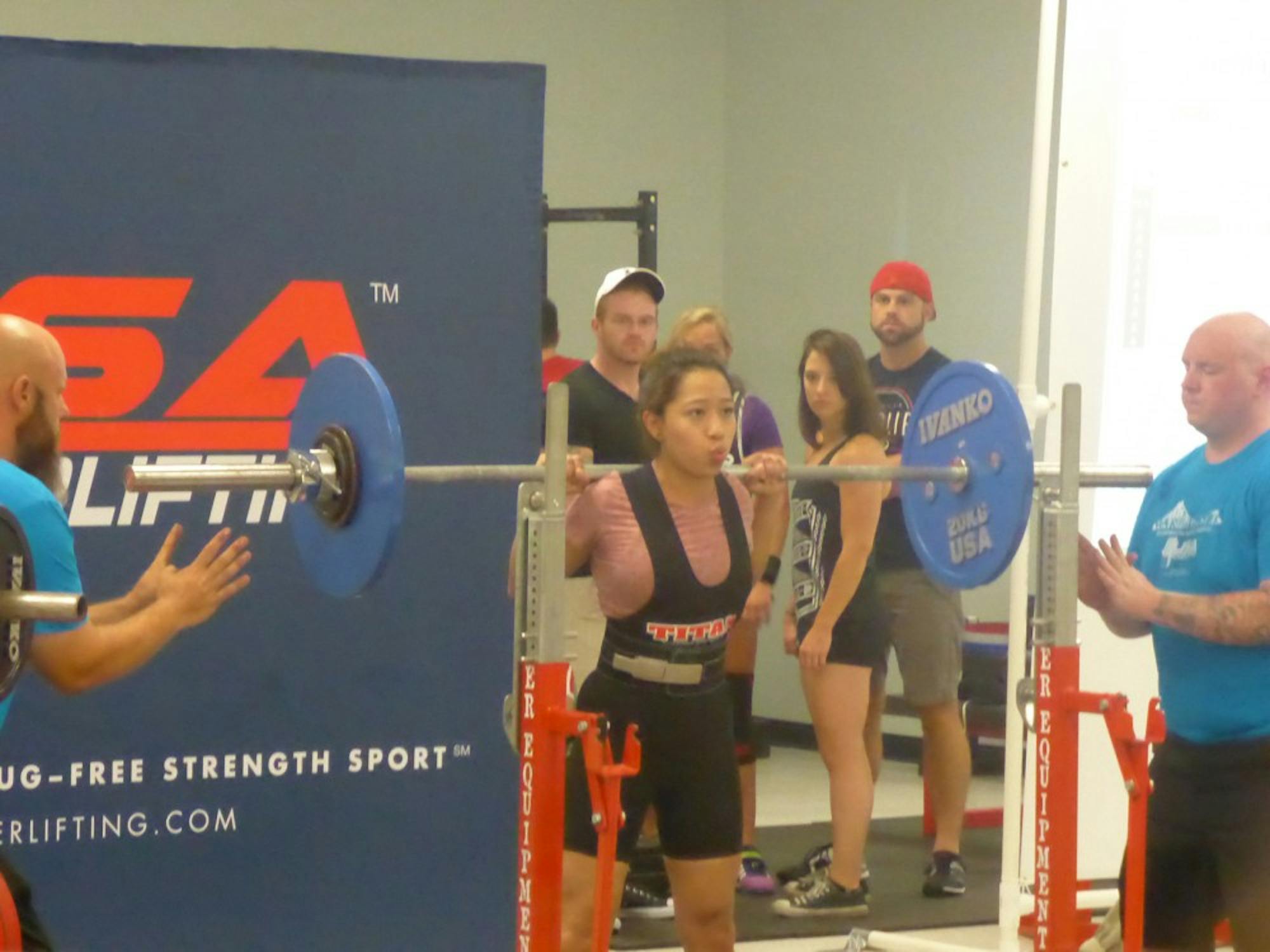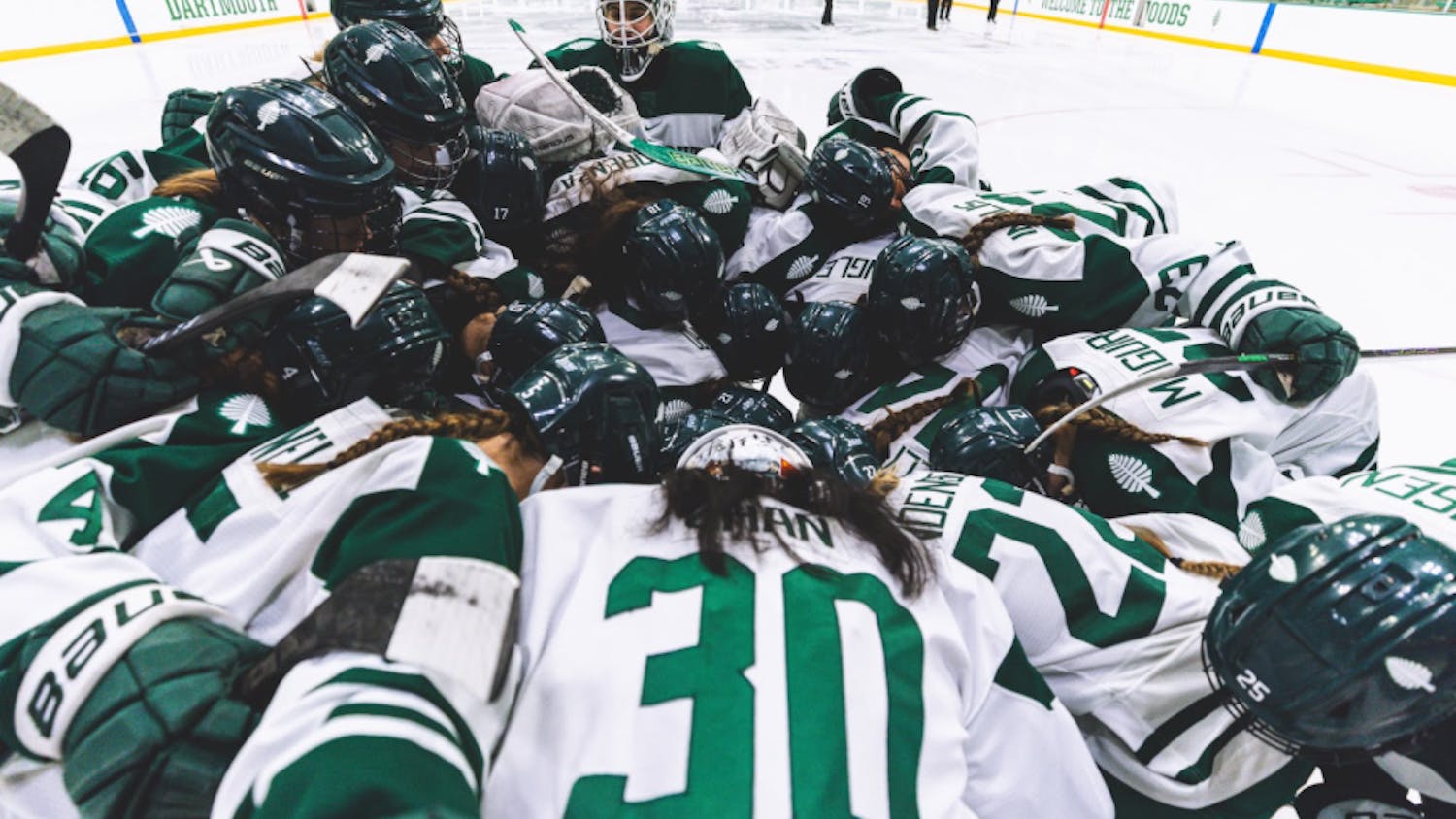It was only last fall when Tony Choi ’16 followed through on his dream to form a powerlifting club at Dartmouth. Despite its humble beginnings, the club accomplished extraordinary feats in its first year, sending nine students to a regional competition in Brooklyn, New York and later sending five to compete at the USA Powerlifting Collegiate National Championship in Providence, Rhode Island held on April 14 to 16.
Powerlifting consists of three lifts: the squat, the bench press and the deadlift. In these disciplines, competitors begin at the referee’s command and either lower into a squat, push the weight up off his or her chest or lift a loaded bar resting on the floor.
At meets sanctioned by USA Powerlifting, an organization that dictates the process of how athletes qualify for regional and national events, athletes are sorted according to their sex, age and bodyweight and must perform one to three of the lifting disciplines. Each competitor has a maximum of three attempts at each lift and the person with the highest total score from the combined weight from each discipline wins. If competitors lift the same weight, the individual with the lowest body weight is declared the champion.
Ivan Carrier ’18 was first introduced to lifting by his uncle as a 12 year old. Now leading the club after its successful inaugural year, Carrier hopes that the team can make even greater strides while continuing to appeal to both casual and hardcore powerlifters.
“One of the central goals is to expand both the community and competitive aspect. We want it to be a good space for people to learn how to be fit, lift and be comfortable in the weight room,” Carrier said. “But we also want it to be a good fit for those who want to participate in competitions.”
To qualify for this year’s nationals, participants needed to reach a benchmark weight in his or her own weight class at an official USA Powerlifting tournament.
At nationals, five members of the team represented the Big Green. In the men’s 83-kilogram class, Devin Lin ’16 placed 28th and totaled 500 kg after squatting 172.5 kg, bench pressing 112.5 kg and deadlifting 215 kg. Andre Chen ’16 totaled 455 kg after squatting 165 kg, bench pressing 97.5 kg and deadlifting 192.5 kg to place 33rd in the same weight class. In the men’s 93 kg class, Choi totaled 452.5 kg and placed 38th. Drake Corbin ’17 placed 13th in the men’s 120 kg class, totaling 572.5 kg. Coralie Phanord ’16 Th’17 totaled 257.5 kg after squatting 95 kg, bench pressing 47.5 kg and deadlifting 115 kg to place 30th in the women’s 72 kg class. Carrier was unable to compete having dislocated his shoulder in an unrelated activity in the winter.
Although other teams outmatched the Dartmouth group in both size and participant numbers, competing in nationals invaluably influenced the structure of the team. The Big Green had difficulty securing practice space, with Floren open only to varsity teams and club teams with full-time coaches and Alumni Gym unequipped to handle a full-fledged powerlifting team.
Originally, the upstairs area was not built to be a gym, so when patrons put down heavy weights, the ceilings of the offices downstairs shake so much that photo frames have fallen off the walls. Over the summer, Carrier secured a deal with the River Valley Club where the team now practices twice a week in a Crossfit gym equipped with rubber floors and plates. But practice wasn’t enough — the team wanted an Ivy League Championship.
Seeing the bigger and more competitive teams at Nationals inspired Dartmouth’s club to model itself after them, Yesenia Mejia ’18, secretary of the powerlifting club, said. The Big Green interacted with competitors from various Ivy League colleges, including Harvard University, Brown University and Princeton University. These interactions motivated the team to contact the heads of the other Ivy League powerlifting teams to set up an Ivy League Championship for powerlifting, Mejia said.
To help make the championship an official meet, Carrier contacted Jim Kipp, a meet director for USA Powerlifting, who immediately agreed to the idea.
After months of planning and coordinating, USA Powerlifting officially released an announcement about the first Ivy League Championship, which is open to any student competitor of an Ivy League school and will take place in Lathem, New York on Nov. 12.
The news was particularly exciting for Mejia, who noted how beneficial the competition will be.
“Powerlifting isn’t a big thing up here,” Mejia said. “The tournament is a good way to expand our team and grow the sport.”
On the logistics side of the Ivy League Championship, Kipp said, Lathem, New York was specifically chosen because of its convenient location off a major highway and its relative proximity to the participating schools. As a USA Powerlifting meet, members from the organization will be present to ensure that athletes are not using performance-enhancing drugs, which is a key aspect of the organization’s mission.
The championship, Kipp said, will also help remove the stigma associated with powerlifters as “dumb guys who just move weights.”
“[These athletes are] also really intelligent people who happen to enjoy powerlifting,” Kipp said.
In some powerlifting contests, winners receive prize money. Because of the competitive nature of the Ivy League, Kipp said a possible idea for future championships is a perpetual championship belt that would foster friendly competition.
Carrier is optimistic about the competition’s potential impact on the sport, hoping that it may allow powerlifting to be more widely accepted.
“A lot of schools are still pretty resistant to powerlifting teams because of the space required and liability issues,” Carrier said. “This annual event may be big in legitimizing many of the teams in the Ivy League.”
Because strength is a fundamental aspect of the sport, USA Powerlifting, which was formerly called the American Drug Free Powerlifting Association, Inc., takes careful precautions, including drug testing, to ensure athletes are not using supplements to gain an advantage.
USA Powerlifting also advocates for the spread of sports medicine knowledge so powerlifters are aware of issues such as muscle imbalances and overtraining.
As a testament of the significant strides the Dartmouth team has made since Choi started the club last year, the team will be the largest participating team at the Ivy League Championship. In fact, inspired by Dartmouth’s commitment to making powerlifting a competitive Ivy League sport, Brown is making moves on its own campus to make powerlifting a legitimate club sport.
In preparation for the conference meet and to help qualify for a spot at next year’s Collegiate National Championships, which will be held in San Antonio, Texas, on April 6, the team has continued to compete in various meets this term. Members traveled to New York for the Northern N.Y. Championships held on Aug. 13. Sam Kim ’18, Andres Jacob ’18, Carrier, Mejia and Cheryl Chang ’18 represented the Big Green, with Carrier, Mejia and Chang setting several New Hampshire State Raw Records in the junior and open categories through their performances in the three disciplines.
The team is also looking to continue expanding by recruiting new members, Carrier said.
“A lot of people don’t know powerlifting is a thing and those who do may be intimidated,” Carrier said. “We hope to get more attention and support from the school.”
Kipp hopes that the sport as a whole will continue to gain traction, especially as Dartmouth continues to act as a pioneer in powerlifting for many of the other schools in the region.
“Powerlifting is strictly a matter of strength and power,” Kipp said. “No matter how big or small you are, there’s a weight class for you. This gives an opportunity for other athletes to participate in a sport where they are equally challenged [by] other athletes.”




